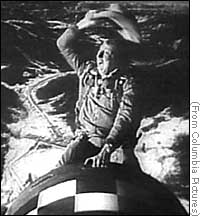

© 2006 William Ahearn
There is little dispute about the greatness of “Dr. Strangelove
or How I Learned to Stop Worrying and Love the Bomb.” Written by Stanley
Kubrick, Terry Southern and Peter George (who had written Red Alert,
the book on which “Strangelove” is based, and who committed suicide
two years after the release of the movie), it is that rare US film that doesn’t
rely on slapstick or juvenile sex jokes to make its comedic points.
Recently I watched it again on DVD and it has lost little over time
even if the immediacy of nuclear war has been diminished by recent events.
It’s a fabulous script that avoids verbal as well as cinematic clichés.
The cast consists of excellent players turning in excellent performances.
The direction is focused, the soundtrack does exactly what it needs to do
and even the screen titles are totally cool. “Strangelove”
was going to be released during the Christmas holiday but the funeral and
mourning of John F. Kennedy pushed the release date into 1964.
In 1963, computers were still in their infancy by today’s standards.
It that year ASCII was created, the first mouse was built (even though it
would be almost 15 years before anyone but a lab rat would use one), Moore’s
law became part of geek speak, and the IEEE was founded. It was the year Steve
“Slug” Russell would create Spacewar!, the first computer game
and BASIC was being developed but wouldn’t be completed until sometime
later in 1964.
It was also the beginning of the third generation of computers. Transistors
had been a major step forward but they ran hotter than tubes creating new
sets of problems for computer designers. In 1958, Texas Instruments developed
the integrated chip using quartz and silicon that led to the semiconductor.
Computers were getting smaller, faster and more reliable. It was during the
third generation that operating systems – allowing for the use of multiple
programs to be run simultaneously – became a reality.
As far as computer movies go, “Strangelove” is the last
mumblings of the voice of reason. Computers play a critical part in the destruction
of civilization – they control the Soviet Doomsday Machine – and
also in its potential rise to a new society – and the dialog between
Peter Sellers and George C. Scott is priceless – but they remain dumb
boxen doing as they’re told. In “Strangelove,” people are
still in charge and are the victims of their own destructive stupidity.
Jean-Luc Godard would change all of that with “Alphaville.”
Many thanks to Matt Wright for the film.
